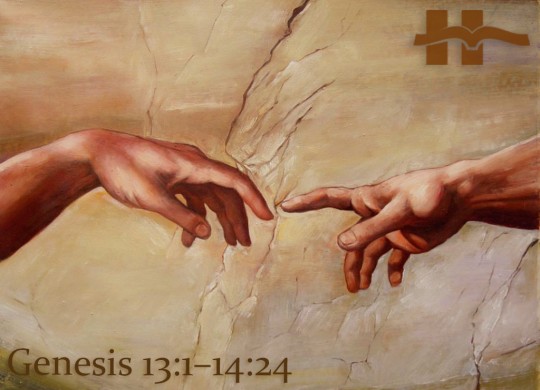Genesis 13:1−14:24

Correction of faithless behavior and return to faithful obedience to God’s demand, trusting in God’s sovereign timing to keep his word, results in divine blessing.
There is a clear sense in which Abram’s departure from Egypt in Gen 13 is a positive event—a return to the sphere of divine blessing, for there are allusions to the exodus of the Israelites from that land: Abram “goes up from Egypt” (13:1; and Exod 17:3; Num 20:5; 32:11; etc.); he is enriched in Egypt with silver and gold (Gen 13:2; and Exod 3:22; 11:2–3; 12:35–36); the land to which he goes is occupied by Canaanites and Perizzites (Gen 13:7 and Exod 3:8, 17; 33:2; 34:11); Abram “settles” in Canaan (Gen 13:12 and Num 33:53; 35:34); and builds an altar there (Gen 13:18 and Exod 17:15).
With regard to Lot, as well, some “corrections” needed to be made by Abram. This was a case of Abram starting over, separating from his relatives as he had originally been called by God to do (Gen 12:1). The episode of Gen 13 ends with Abram realizing the necessity of full obedience to God’s demand, without which one keeps oneself outside the sphere of divine blessing. Genesis 13, for Abram, was therefore both historically and literarily a reversal of direction, a correction of faithless behavior, a getting back to square one, back into the Promised Land. And there, one more problem needed to be taken care of—Lot.
Unlike Abram who “settles” in the land of Canaan, Lot chooses to “settle” in the place of wicked men and sinners (13:12–13). The first builds an altar “before/to Yahweh” (13:18), the second dwells with those who are wicked and sinners “before/to Yahweh” (13:13). Lot walked by sight: he lifted up his eyes and saw. One was told to lift up his eyes (13:14); the other did it himself. One waited for God to give it; the other took it for himself. Lot is making some significantly bad choices here. He also travels eastward (13:10): thus far in Genesis, east has not been an auspicious direction in which to travel—the route of banishment of Adam and Eve (3:24) and Cain (4:16); even the Babelites are linked with “east” (11:2). Thus Abram and Lot are spatially separated (13:11), but even more, morally separated: one settles in the land Yahweh owns and in which Yahweh dwells; the other settles in the land of the wicked and sinful. And after the uncle-nephew separation, for the first time God affirms that “all the land” would be Abram’s and his descendants’ forever (13:14–17). This is significant: only full, faithful obedience (or return thereunto) will retain the blessings of God’s promises.
Later, in Gen 14, Abram and his homegrown army will rescue Lot and his chattel from the clutches of a bunch of marauding kings and their armies. It is after this incident that the patriarch runs into another local king, Melchizedek, to whom Abram gives a tenth of the captured booty (he gives the rest to his allies in the battle, not keeping any for himself; 14:20). Melchizedek thus becomes the first foreigner to be blessed by Abram, fulfilling 12:3. Abram’s giving to this “priest of God Most High” (14:18) and his claim that it was not man who made him rich, are indicators of Abram’s trust in that same God, Yahweh, the one who had blessed him. The patriarch, in sum, trusts God to work out his land promise in his own time and in his own way.












 Abe Kuruvilla is the Carl E. Bates Professor of Christian Preaching at The Southern Baptist Theological Seminary (Louisville, KY), and a dermatologist in private practice. His passion is to explore, explain, and exemplify preaching.
Abe Kuruvilla is the Carl E. Bates Professor of Christian Preaching at The Southern Baptist Theological Seminary (Louisville, KY), and a dermatologist in private practice. His passion is to explore, explain, and exemplify preaching.